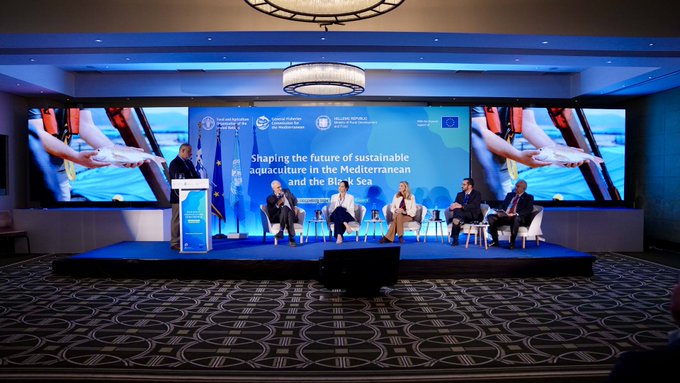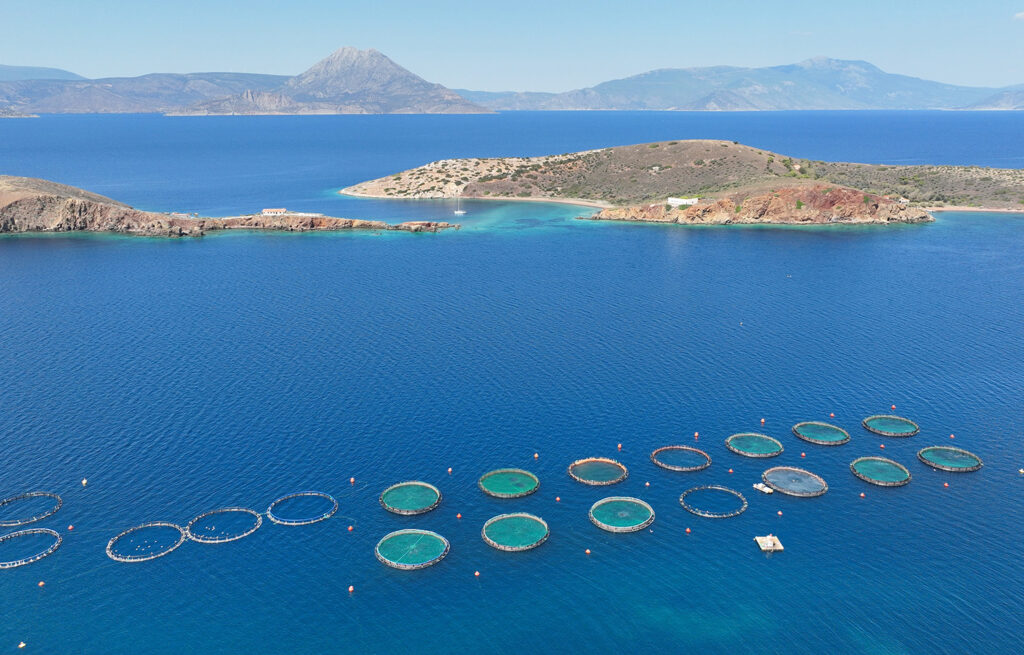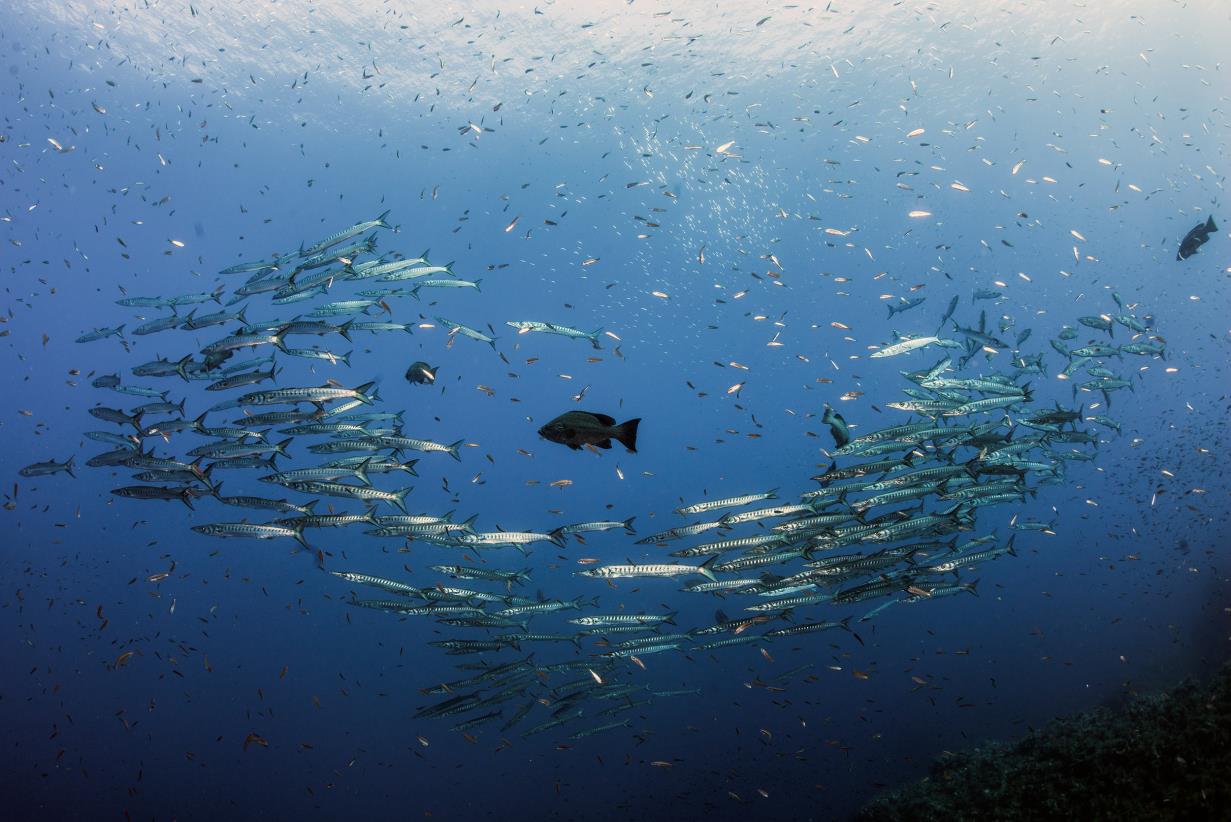Food & Climate
The activities of the regional conference on aquaculture “Shaping the Future of Sustainable Aquaculture in the Mediterranean and the Black Sea“, organized by the General Fisheries Commission for the Mediterranean (GFCM), started today during the period December 4-5, 2024 in Heraklion, Greece.
The conference highlights the importance of aquaculture within the framework of existing political commitments and works to generate visions and solutions to enhance future actions towards a sustainable and resilient sector in the region. It also aims to assess the progress made in developing sustainable aquaculture to achieve the goals of the GFCM Strategy 2030.
The event attracted high-level representatives from Mediterranean and Black Sea countries, aquaculture experts, researchers and academia, government representatives, members of international, governmental and non-governmental organizations, producers and stakeholders from aquaculture platforms and aquaculture farmers’ organizations across the region, including the Minister of Rural Development and Food of Greece, the Director-General for Maritime Affairs and Fisheries of the European Commission, the Deputy Regional Representative for Europe and Asia, FAO and others, according a press release that “Food & Climate” platform received.
The Regional Aquaculture Conference “Shaping the future of sustainable aquaculture in the Mediterranean and the Black Sea” is a not-to-be-missed opportunity to discuss the future of aquaculture in the Mediterranean and Black Sea region, following a decade of progress since the landmark 2014 Bari Conference.
This conference is organized by Food and Agriculture Organization of the United Nations (FAO) & General Fisheries Commission for the Mediterranean (GFCM) and the Government of Greece, with the financial support of the European Union.

12 binding agreements
During the 47th session of the UN General Fisheries Commission for the Mediterranean, held in Rome in November, 12 binding agreements and a further five pivotal decisions were made concerning the future of the region’s fisheries and aquaculture sectors, according the “The Fish site“
“This annual session concluded a year of intense, collaborative efforts and demonstrated the continued commitment of GFCM members to address the ever-increasing challenges facing the fisheries and aquaculture sector in our region,” said Miguel Bernal, GFCM Executive Secretary, in a press release.
The development of the aquaculture sector within the Mediterranean and Black Sea was a key point of discussion at this year’s session, with the progress made towards enhancing sector sustainability being highlighted alongside the numerous assistance programmes established throughout the region over the last year.
The attendants also addressed the growing challenges posed by climate change, with specific focus on the spread of diseases associated with aquaculture operations. Attempting to mitigate the threats of disease spread, both to aquaculture operations and wider ecosystems, the attendants set in place a key agreement to set up an aquatic disease monitoring network.
Principles for responsible investment in aquaculture were also adopted, aimed at enhancing the sector’s attractiveness to investors and highlighting its role in food security.

Fair and productive fisheries
In addition to aquaculture, the Commission hosted discussions focussing on the region’s fisheries, which currently are reporting the lowest percentage of overfished stocks for this decade, although fishing pressure is still at twice the level considered sustainable. In light of this, the Commission agreed on the reinforcement of measures addressing the management of numerous GFCM priority species, including European eel, red coral, blackspot seabream, European hake, Norway lobster, European sprat, turbot, rapa whelk, piked dogfish and sturgeon.
In the Adriatic Sea, the finalisation of a rigorous management strategy evaluation process supported a landmark decision to establish single species harvest control rules and annual catch limits for sardine and European anchovy, moving away from the joint catch limits enforced until now and promoting ecological sustainability and economic stability.
A new spatial management plan was also discussed, with the present countries agreeing to a fisheries restricted area in the Otranto Channel in the Adriatic Sea. This decision establishes a core area where bottom trawling activities are banned in order to protect vulnerable marine ecosystems formed by bamboo coral and enhance the productivity of marine living resources through the protection of essential fish habitats, such as those of deep-water red shrimp. It also delineates a buffer area, where fishing activities are regulated.
All decisions adopted at the annual session are geared towards putting the long-term future of the region’s fisheries and aquaculture sectors on a sustainable footing.

“Looking forward, I am confident we can raise the bar and together meet the challenges before us. I would also like to recognise and congratulate those who collectively contribute to our efforts, from experts and administrators to fishers and farmers, for their strides and commitment to our ever-growing work, as the ultimate beneficiaries of our decisions,” concluded Fouad Guenatri, Ministry of Fisheries and Fisheries Production, Algeria.

